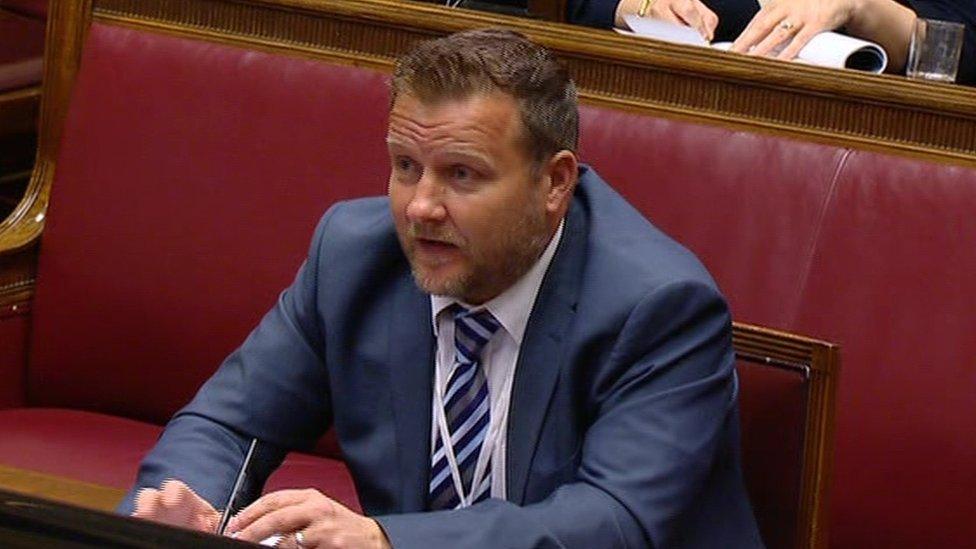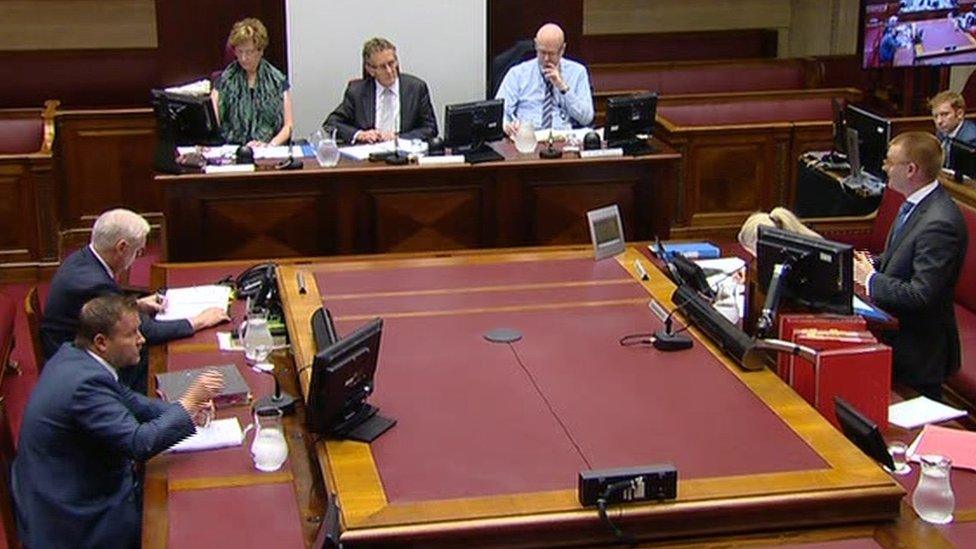RHI manager 'unaware' of newspaper articles about scheme
- Published

Stuart Wightman appeared before the inquiry on Wednesday
A manager of the renewable heat incentive (RHI) scheme says he was never told about articles in two national newspapers warning about abuse in the scheme in Great Britain.
Stuart Wightman said if he had been aware, he is sure the content would have been escalated to the minister.
Arlene Foster was the minister at the time.
The articles appeared in the Daily Mirror and Guardian in late 2014 and early 2015.
At the time officials in Northern Ireland were planning to extend RHI to domestic homes.
The RHI scheme was established to encourage up-take of eco-friendly heat systems over the use of fossil fuels.
An overgenerous offer of fuel subsidies meant it could cost taxpayers an extra £490m.
Newspaper articles
The Daily Mirror article was published in November 2014 under the headline: "Rich enjoy free fuel AND taxpayers' cash while millions must choose between heating and eating".
The Guardian published a news article, and later a separate opinion piece, by well known environmentalist George Monbiot.
In the news report the Guardian claimed the scheme in Great Britain had been rolled out without basic checks and encouraged waste.
In his column Mr Monbiot wrote: "the more fuel you burn, the more money you are given".
"So rich people are now running their oversized boilers at full steam and leave the windows open to cool the house.
"The returns are astonishing: 20, 30 sometimes 40%."

The RHI scheme was established to encourage up-take of eco-friendly heat systems over the use of fossil fuels
'Should have been raised'
Inquiry counsel Joseph Aiken asked whether the press office in the Enterprise Department (DETI) had a role in collating relevant newspaper clippings.
Mr Wightman said he would have expected them to be circulated to his boss, John Mills, who headed up the Energy Division in the department.
Mr Aiken suggested that it should have also ended up in a submission to the minister.
Mr Wightman agreed it should have been raised with Arlene Foster.
However Mr Aiken said following checks with the department there was no record of the articles having been saved in the department's digital record system called TRIM.
Mr Aiken said it was particularly surprising that no-one had raised the articles with the RHI team in DETI, especially as the equivalent department in Great Britain had been quoted in the news articles.
'Lack of clarity'
Later on Wednesday, the inquiry was told that even as the crisis was unfolding there was no clarity amongst officials about the budget consequences.
Mr Wightman said from March 2015 they knew they had a problem but thought they could get more money from Treasury to cover the overspend.

The RHI Inquiry is not expected to publish a report until the end of this year
Mr Aiken said Mr Wightman had spent the summer "going round the houses" in officialdom trying to work out the position.
At one point he suggested that because the scheme in Great Britain had under spent, some of that money could be used to cover an overspend in Northern Ireland.
He said officials in the finance division of his own department understood the potential consequences for the departmental budget but it was not explained to him.
He was simply told to stop entering into commitments to prevent the subsidy bill increasing.
An attempt was made to pause applications but scheme administrators in the Office for Gas and Electricity Markets (OFGEM) told him they had no power to do that.
Mr Wightman said it was December 2015 before he knew for sure that 100% of any overspend would have to be met from the department's budget.
- Published6 June 2018

- Published7 November 2017

- Published13 March 2020
